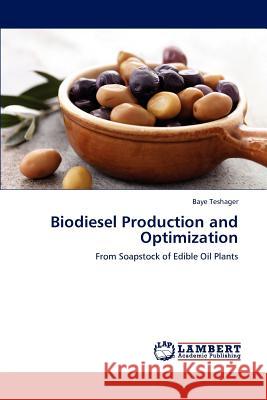Biodiesel Production and Optimization » książka
Biodiesel Production and Optimization
ISBN-13: 9783843386579 / Angielski / Miękka / 2012 / 116 str.
Up-to-date semi-refined and refined vegetable oils are the predominant feedstocks for the production of biodiesel. However, their relatively high costs render the resulting fuels unable to compete with petroleum derived fuel. In this book, the production of fatty acid methyl esters (FAME; biodiesel) from soapstock, a byproduct of edible oil refining, have been analyzed. A hydrolysis route is used to produce FAMEs from cottonseed soapstock. The method involved complete saponification of soapstock followed by drying and making as a pulverized powder. Esterification of saponified, dried and pulverized soapstock with methanol was held in the presence of sulfuric acid as a catalyst. FAME products were purified as in a sequence of centrifuge at 4200 rpm, neutralization, methanol recovery in rotary evaporator, and absorption with anhydrous magnesium sulfate to dry water and silica gel to adsorb free fatty acid (FFA) in a bed column. The book also contains optimum production conditions and preliminary economic evaluation indicating that a soapstock-biodiesel can be used as a complimentary fuel for countries such as Ethiopia which depend entirely on importing petroleum.
Up-to-date semi-refined and refined vegetable oils are the predominant feedstocks for the production of biodiesel. However, their relatively high costs render the resulting fuels unable to compete with petroleum derived fuel. In this book, the production of fatty acid methyl esters (FAME; biodiesel) from soapstock, a byproduct of edible oil refining, have been analyzed. A hydrolysis route is used to produce FAMEs from cottonseed soapstock. The method involved complete saponification of soapstock followed by drying and making as a pulverized powder. Esterification of saponified, dried and pulverized soapstock with methanol was held in the presence of sulfuric acid as a catalyst. FAME products were purified as in a sequence of centrifuge at 4200 rpm, neutralization, methanol recovery in rotary evaporator, and absorption with anhydrous magnesium sulfate to dry water and silica gel to adsorb free fatty acid (FFA) in a bed column. The book also contains optimum production conditions and preliminary economic evaluation indicating that a soapstock-biodiesel can be used as a complimentary fuel for countries such as Ethiopia which depend entirely on importing petroleum.











